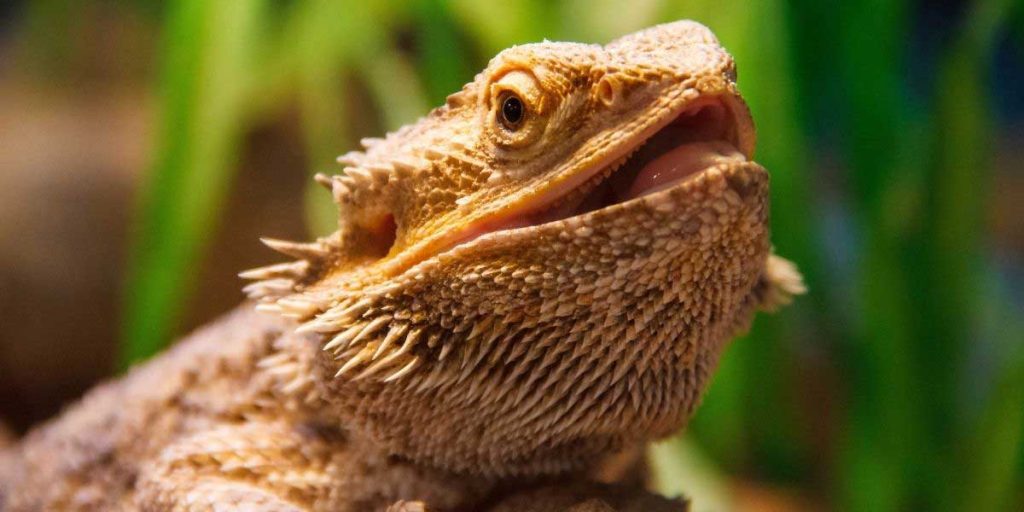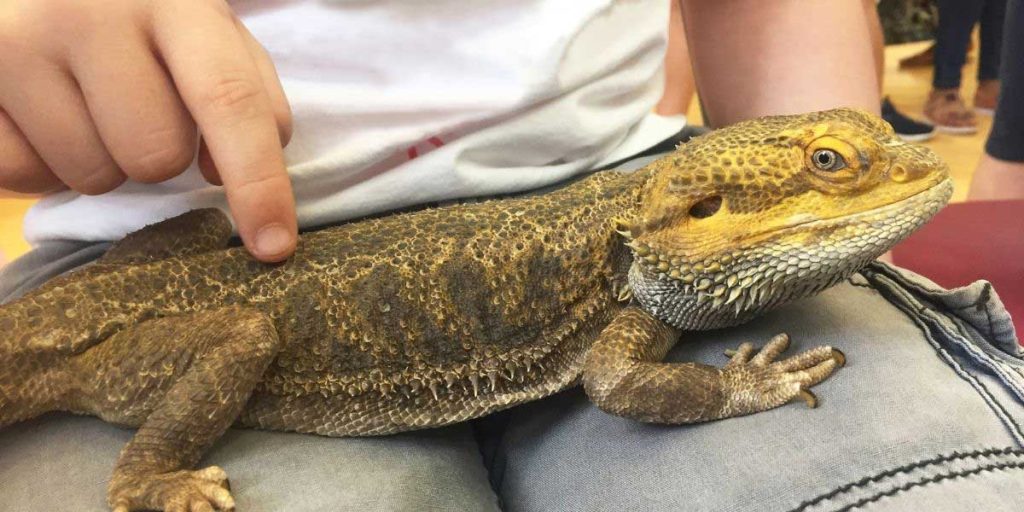Bearded dragons have small teeth embedded in their upper and lower jaws, and they use their teeth for cutting and chewing their food.
The purpose of bearded dragon’s teeth is to chew food, but they will bite if mishandled. They will bite for self-defense, excitement, or if they are in hunting mode. The bite is not harmful to humans but can be dangerous to other bearded dragons.
Your bearded dragon is not a provocative predator that will pursue to bite you. However, they tend to be very defensive because of their adaptive reflexes. In their native habitat, they are prey to many predators, which explains why they are very defensive.
Why Would Your Bearded Dragon Bite You?
Your bearded dragon will mainly bite you if you mishandle it. You should take precautions and be well experienced in holding them.
Since there are many reasons why your dragon pet may bite, you should learn all the incidents that may provoke it. The bearded dragon is a calm, docile and friendly pet. If you avoid startling it, you will have denied it the reason to bite you.
Your ability to interpret what your bearded dragon tells you will help you avoid bites.
Following are some of the reasons why your bearded dragon will bite you.
Poorly Socialized Bearded Dragon

If your pet dragon is not well tamed to bond with humans, you will have difficulties controlling it. If you buy a bearded dragon, see that you buy from credible breeders, and good breeders tame their dragons well enough before selling them.
A dragon that is poor in bonding with humans will mostly be defensive and will attempt to bite you if you approach it. You must spend more time with your pet if you notice this problem.
Spending more time with your dragon will help it get familiar with you. Once it starts feeling comfortable around you, you’ll have an easy time handling it.
Poor Handling of Your Bearded Dragon
Handling your bearded dragon is a skill you should learn. How you approach, pick, and hold it is an experience that you have to acquire.
You will often handle your bearded dragon when feeding, playing, or treating it. If you poorly handle it, it will become unfriendly. If you see it squirming in your palm, it is a sign that it is not comfortable. Maybe you are squeezing it, or it is sensing some threat.
If you fail to correct your handling mistakes, the next time you want to pick up your pet, it might bite or threaten to bite you.
Stress or Discomfort
Stress or discomfort is mainly a result of illness or an unfamiliar environment. Since the pet is under your responsibility, you should ensure that any cause of stress is checked. Apart from illness or change of environment, other pets like dogs within the vicinity can also cause stress.
If your pet is stressed, it will be generally unfriendly. You will notice it wanting to escape from you or refusing to eat. It may even exhibit more weird behaviors like eye bulging.
You should approach your bearded dragon with caution if it is under stress. There is a high likelihood of it biting you if you move to hold it, and it is a sign that it doesn’t want disturbance.
Your Bearded Dragon is Overexcited
An excited dragon will be playful or restless, and it will exhibit the excitement behavior in its enclosure or when playing with it.
If it is in its enclosure, you should give it space until it calms down, and it may bite you if you move to hold it.
If you are playing with it and you notice it is attempting to bite, return it to its enclosure. Allow it time to calm down from the excitement before you can hold it again.
Self-defense
If your bearded dragon feels threatened, it will switch to defensive mode with defensive behavior such as fluffing of the beard. When in defensive mode, the likelihood of your bearded dragon biting you is very high.
If you must hold it, first find out why it is in defensive mode. If there are other pets like cats within the vicinity, get rid of them. You should also ensure your approach is slow and not rushed.
If your bearded dragon is poorly socialized, it will often exhibit defensive behaviors until it bonds with you. You should be patient and continue creating a bond with it.
Most important is to approach it in a way your bearded dragon will not feel threatened.
Your Bearded Dragon Could Be Hungry

When your bearded dragon is hungry, it will switch to hunting mode. When in hunting mode, it will move to bite anything that looks like prey.
Before playing with your bearded dragon, ensure that you have fed it first. If it is hungry, it will attempt to attack your fingers.
When feeding your pet, avoid having your fingers too close to it. When your fingers are moving, it may mistake them for a worm and move to attack. It would help if you used tongs to prevent biting you when feeding your dragon.
Another effective way to avoid being bitten is sticking to a regular feeding program. Don’t let your pet get too hungry.
Also, make sure your hands are washed clean with water and soap before you feed your hungry pet. The smell of food on your fingers may make the dragon attack and bite your fingers.
How Dangerous Is The Bite Of A Bearded Dragon?
The bite of a bearded dragon has a mild effect that is not threatening to your health. They have tiny teeth that leave minor marks on the skin or a slight piercing. They are also not poisonous, although they may pass salmonella bacteria to your skin. However, salmonella is easy to treat, so it should not scare you.
If your bearded dragon bites you, you will notice a tiny mark or piercing on the skin. The first aid for bearded dragon bites is washing the area with water and soap.
The seriousness of your bearded dragon bite is dependent on whether it has pierced your skin. Juvenile dragons cannot break your skin since their teeth are tiny, but an adult dragon’s bite can pierce your skin depending on its applied force.
Some factors will determine how you respond to the bite of a bearded dragon, including;
The Venom of the Bearded Dragon

If the dragon bite has managed to pierce your skin, then it means it has secreted venom into you. The venom is meant to immobilize their prey. Since their preys are small insects and worms, the amount of venom they secrete is too minute to affect you.
You may experience minor itching, which is a reaction to the venom. Although the effect is minor, you should pay attention to how your body reacts.
Salmonella Bacteria
Bearded dragons carry salmonella bacteria in their mouth or skin. Regardless of whether the bite has pierced your skin or not, immediately wash the area with soap and water, and it is also recommended you apply an appropriate disinfectant.
How Painful Is the Bite of Bearded Dragon
The bite of a bearded dragon feels like a small pinch. Afterward, you may experience a slight itching.
The pain you feel is dependent on the intensity of the bite. The teeth of juvenile and baby dragons are too small to hurt. However, adult dragons have more developed teeth, and their bite may hurt more.
Whether juvenile or adult, your pet’s intention of the bite will tell it how strong it bites. The following factors will determine how much the bite by your pet hurts:
1. Intention Of The Bite
A threatened bearded dragon will bite you to attack an enemy, and its bite will be more intensive than an accidental bite by a dragon snatching the food.
2. Age Of The Dragon
The bite of a juvenile bearded dragon has little intensity since its teeth are not fully developed. It is also not strong; hence its biting force is little. However, the bite of an adult dragon may hurt more because it’s fully developed.
Signs to Warn You that Your Bearded dragon will Bite You
Your bearded dragon will not just jump on you and attack, and it will exhibit some behaviors to warn you. Look out for the following behaviors, and you may avoid bites from your pet.
- Blackening of the head: Your bearded dragon will turn its head black when ready to attack. It is a sign of aggression, meaning your pet is feeling threatened.
- Flaring of the beard: A flared beard tells you to stay away. It signifies aggression towards your advance.
- Puffing the body: Your pet will suddenly puff up and look more prominent. It is telling you that it’s ready to defend its territory.
- Hissing and stamping: It is a way of showing dominance and power. It is telling you to keep off.
- Attacking the enclosure: Your pet will be restless, running around and attacking anything around it. It is a sign of aggression.
- Head bobbing: Head bobbing is another sign of aggression that tells you to stay away. The pet is signifying authority in its territory.
Following Rules to Avoid Bearded Dragon Bites

By adhering to the following precautions, your bearded dragon will not have a reason to bite you.
- When picking up your bearded dragon, approach your hand from the side. Don’t reach it from the front of the head.
- Don’t mishandle your dragon to lie by the side of the body.
- If you hold it and it is continuously squirming, let it go.
- Avoid squeezing your bearded dragon when holding it.
- Avoid approaching your dragon if it shows signs of aggression, such as puffing.
- Don’t approach your bearded dragon from the top when picking it.
- Ensure you wash your hands before holding your bearded dragon.
- Feed your pet on a regular schedule.
- Don’t leave your bearded dragon hungry for a long time.
FAQ’s about Bearded Dragon
Conclusion
Bearded dragons are calm and docile pets that won’t bite unless you mishandle them. You should master the skills of approaching, picking, and holding your dragon. Further, it would help if you learned what provokes bearded dragons and the behaviors that warn you.
Although bearded dragon bites are not dangerous to your health, they are not pleasant. Above that, serious bites that pierce the skin will require medical attention if you have contacted salmonella bacteria. Generally, bearded dragons are friendly pets that color your home and give you good company.
To get more updates about bearded dragons, make sure to sign up so that it’s easier.





Leave a Reply